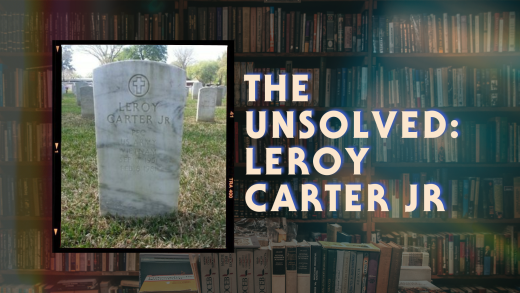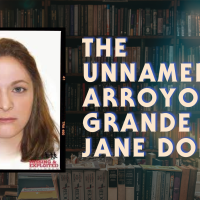This month’s unsolved murder takes us all the way back to the 40’s in Old Hollywood. An aspiring actress and oil heiress moved to Hollywood to pursue her dreams. Two months later she was found strangled to death in her apartment. Who attacked Georgette Bauerdorf, and why is the case still unsolved more than three quarters of a century later? Let’s Explore
Who Was Georgette?
Georgette Elise Bauerdorf was born on May 6, 1924 to parents George and Constance Danhauser Baurdorf and older sister Connie Bauerdorf. The family lived in Manhattan, New York City, NY. George was a wealthy oil magnate, allowing the family to live an upper class lifestyle with many luxuries, such as private school and lavish homes. When Constance died in 1935, the family opted to move across the country to Los Angeles, CA. In LA, Georgette attended a school that Town & Country magazine called “the best girl’s school in America” – the Marlborough School. Georgette also attended the Westlake School for Girls. Both schools were elite college preparatory schools.
Georgette apparently caught the acting bug while living in Los Angeles. After graduating, she decided to pursue her dream of being on the silver screen. Georgette moved to Hollywood in 1944, where she lived alone in a unit at the El Palacio apartment complex. To support herself, she got a job as a hostess at the Hollywood Canteen. The Canteen was a popular club for servicemen in the 40s. It was an interesting set-up, where all that was needed to enter was a military uniform and servicemen were not charged for drinks or food. As a hostess, Georgette danced for and with the servicemen, along with more mundane tasks.
On June 13, Georgette met a young private at the Canteen. His name was Jerome Brown, and he was stationed at Camp Callan in California. Georgette was enamored, despite the fact that Jerome was shipped off to El Paso only a few days later. Undeterred, Georgette wrote him six letters over the coming weeks. Georgette told her friends that Jerome was her boyfriend and that she was going to visit him.
On October 11, 1944, Georgette cashed a check for $175. She also purchased a plane ticket to El Paso, totaling $90. She had lunch with her father’s secretary, Rose Gilbert. The two women had a fun day, lunching and shopping. Gilbert told investigating officers that Georgette had seemed normal, in “good spirits.” Later that afternoon, Georgette went to work at the Canteen. During work, a coworker noticed a serviceman continually trying to dance with Georgette.

via Wikipedia)
The Murder
Georgette left the canteen around 11:30 PM that night. Her coworkers saw her walk to her car and drive away. Though the exact time Georgette arrived home is unknown, she was thought to have arrived around midnight. When she arrived home, she apparently had a dinner of beans and melon. A janitor at El Palacio heard her walking around in heels and a small crash shortly after midnight. The apartment was then quiet until 2:30, when a neighbor heard a woman screaming.
Georgette was screaming at her killer, asking them to stop. Saying that they were killing her. That murderer has never been identified. It is unknown whether Georgette let her killer in or if they snuck in at some point. There were no signs of a struggle, and there were two ashtrays on the bathroom floor, perhaps hinting at Georgette having a guest that night. The only sign that something was wrong was the neighbor hearing her screams. She was raped and strangled. After, Georgette was placed face down in her bathtub, and the hot water tap was turned on.
Cleaners at the El Palacio arrived at her apartment shortly after 11 o’clock on October 12. The three cleaners – the Atwood family, which consisted of a man, woman, and their daughter – cautiously entered the apartment after seeing the door ajar. The wife went upstairs to investigate the sound of running water – she was the one to discover Georgette’s body. Mr. Atwood drained the water in the tub immediately, thinking that perhaps Georgette had fainted during her morning routine. But when Georgette did not respond, they called the police.

via the LA Public Library)
The Investigation
The Police arrived at the scene around noon. They scoured the apartment for any clues to what had happened, finding a spot of blood on the floor between the bathroom and the bedroom. The carpet was wet at that spot and looked as if someone had tried to scrub the stain, but was unsuccessful. Georgette’s wallet was on the floor, and her jewelry was in plain sight. Both were untouched, leading to the theory that robbery was not the motive. Investigators estimated that the time of death would have been between eight and ten hours prior to their arrival. When examining her body, a nine by nine inch piece of cloth was found in Georgette’s throat, likely to stifle her screaming during the attack. The lightbulb outside of Georgette’s apartment had been unscrewed slightly as well, to possibly obscure the murderer’s identity as they came to and went from the apartment. The investigators ruled that the likely motive for the murder was the rape.
There were several suspects that came forth during the investigation. The first was the young enlisted man who had been desperately trying to dance with Georgette the previous night. He was eventually identified as Cosmo Volpe, a soldier originally from Astoria, New York. Despite the accounts that he was insistent on dancing with Georgette, he disputed that narrative. According to Volpe, he was teaching Georgette to dance, because she wanted to learn. Nothing else linked Volpe to the murder.
The second suspect was Kenneth Raymond, a 23-year old soldier who went AWOL. He was accused of killing a 5 year old girl named Rochelle Gluskoter in 1946. Rochelle was playing in a friend’s yard on February 15, when she was lured into a car driven by a stranger. Her skeleton was found in 1947 by a rabbit hunter. Though the remains were fully skeletonized, she was identified by her clothing. Raymond was not conclusively ruled to be Rochelle’s killer, but as a result of that investigation, he was also questioned about Georgette’s murder.
Our third suspect was named John Sumter, who confessed to the murder to the FBI in San Fransisco. However, Sumter eventually admitted that he had fabricated his whole confession in order to get the death penalty, as he had no reason to life. He had been dishonorably discharged by the military for passing bad checks. After his false confession, his family came forward to disclose that he struggled with mental health issues.
The last suspect we will discuss was named Robert George Pollock White. While he was not connected to the case in the initial investigation, he did go on to attempt to murder a 65-year old woman. During the attack, White shoved a cloth down the woman’s throat. It was that detail, so similar to Georgette’s murder, that put him on the radar. White was also found to have been in Los Angeles at the time of the murder. However, these circumstantial points did not lead to more evidence. White was unable to be definitively linked to the case.
There were also two suspects that surfaced during the investigation that were never identified. In 1945, a high school student found a letter addressed to the LAPD. The letter writer claimed that the murderer would be at the Canteen on a certain date, claiming that they had seen action in Okinawa. The letter ended by saying “The murder of Georgette Bauerdorf was divine retribution. Let the Los Angeles police arrest the murderer, if they can -” Unfortunately, nothing came of the letter. June Ziegler, Georgette’s close friend, also told police that an extremely tall soldier had held a keen interest for Georgette. Georgette went on a few dates with the man, but eventually refused to go on any more. Ziegler said that Georgette simply did not like the man. Ziegler could not recall a name or any other details regarding this man.
Investigating Agencies
And that’s where we’re at. No other persons of interest have surfaced in the time since the murder. Georgette’s killer remains uncaught and her case unsolved. Due to the time passed since the murder, the case is cold and likely closed. However, if you or anyone you know has information about who killed Georgette Bauerdorf in the early morning hours of October 12, 1944, you can contact the LA County Crime Stoppers at 1-800-222-8477.
Sources
- https://www.georgettebauerdorf.com/
- http://www.unsolvedcasebook.com/georgette-bauerdorf/
- https://morbidology.com/a-hollywood-crime-georgette-bauerdorf/
- https://the-line-up.com/georgette-bauerdorf-unsolved
- https://www.trace-evidence.com/georgette-bauerdorf
- https://stevehodel.com/2016/08/13/spellchecking_a_serial_killer/
- https://www.clermontsun.com/2021/05/20/marc-hoover-who-killed-the-wealthy-socialite
- https://ladailymirror.com/tag/georgette-bauerdorf/
- https://www.timeout.com/los-angeles/blog/southern-californias-thirteen-most-infamous-unsolved-murders-102116
- https://www.findagrave.com/memorial/39060607/georgette-elise-bauerdorf
- https://www.nytimes.com/1944/10/14/archives/miss-bauerdorf-oil-mans-daughter-slain-by-strangler-in-her.html
- https://books.google.com/books?id=a7Te2BbKW7oC&pg=PA301&lpg=PA301&dq=georgette+bauerdorf&source=bl&ots=xLORpeSlrl&sig=ACfU3U0jDRGCZVglVS21fyNlOxsYBczOdQ&hl=en&sa=X&ved=2ahUKEwi_79yjvtvxAhWFPM0KHTD_BXQ4bhDoATAEegQICRAD#v=onepage&q=georgette%20bauerdorf&f=false










My opinion are is that I believe that the Georgette baverdorf murder and the Louise Springer murders are related long with the murder of jean ellroy 9 yrs later…I believe all three of these murders are related and I believe the same killer committed these three same crimes..and for what I gathered and studied i do not believe that George hodel committed none of these murders his mo from the black dahlia murder do not fit the killer mo In these three murders..plus these three murders have alot of the same patterns for one all three victims Georgette Louise,and jean all three was physically assaulted before raped and raped before killed from strangulation.. Georgette and jean was both seen in the same present with a swarthy dark hair man both danced with a swarthy man I mean this shit couldn’t had been a coincidence and in the Louise Springer and jean ellroy cases now this what makes me believe both of these two was killed by the same man one both of them was beaten second both of the victims Louise and jean both was strangled with a clothesline cord the only difference about they murders are one was not strangeled with a nylon stocking but if u look at these two cases Louise Springer was killed by the swarthy man in 1949 and 9 yrs later that same swarthy man resurfaced in that desert inn bar in El Monte CA and murdered jean ellroy in Jun of 1958..those two cases definitely related killer same mo clothesline cord physically assaulting both victims before he rape them and raped them before he killed them both by Strangulation. Jackets being involved in Louise and jean murders and the same as Louise skirt was tangled round her body jean ellroy dress was tangled up so it definitely proved they was killed by the same man..and I don’t believe George hodel had nothing to do. With now of these murders I believe it was his right hand man painter Fred Raphael sexton..he fits the suspect composite sketch in. The jean ellroy murder to the tee and go back to the Georgette murder he Fred sexton killed her look at when she left if it could prove that if she left in a cab and remember she was killed doing the war yrs if u look at Fred sexton I believe he was driving cabs in la doing that time even having Hollywood connections even working on Hollywood sets then that could put him at that Hollywood canteen party and if they can find that he drove cabs that year and Georgette left in a cab then that could place him around her in which I believe Fred sexton killed her and the two other victims I named in this message
Plus if you look at the month of which Louise Springer and jean ellroy was murdered both in the month of June and if u research Fred Raphael sexton you would see that his birthday in the same month I believe June3 Louise Springer was killed a week after sexton birthday and jean ellroy was killed less then there weeks after Fred sexton birthday it’s something strange about that I mean it’s not a coincidence it’s like he choosed to murder in the same month weeks after his birthday I mean this something to look into
Very interesting! I’ll have to look into it more and see what historical documents I can dig up.